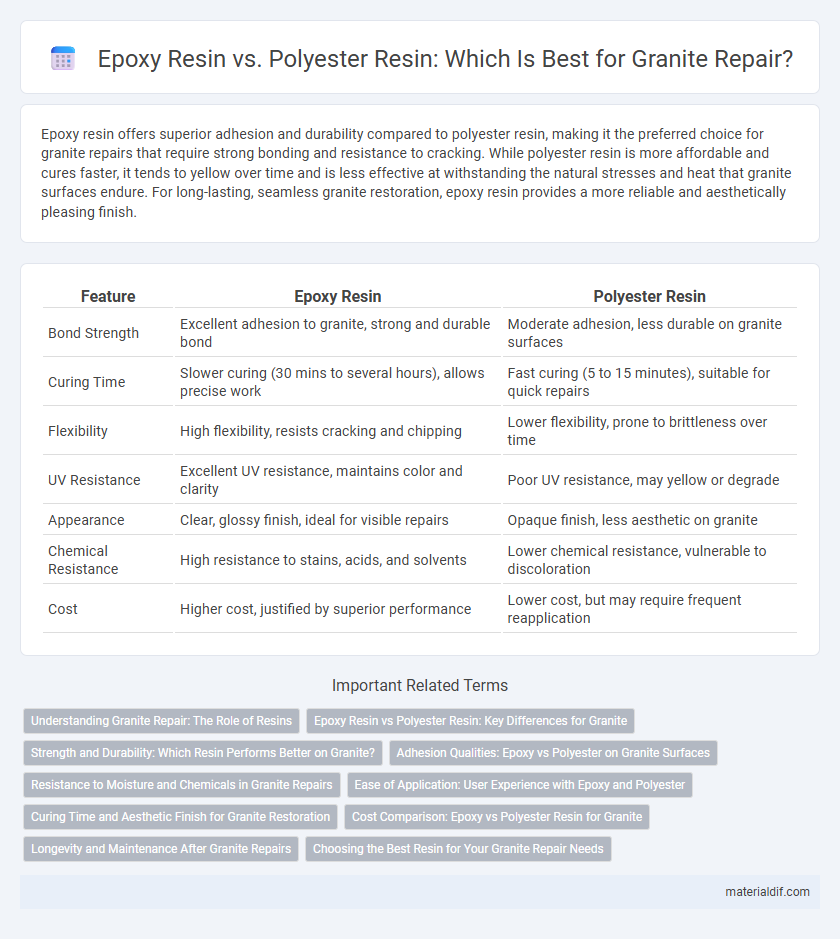Epoxy resin offers superior adhesion and durability compared to polyester resin, making it the preferred choice for granite repairs that require strong bonding and resistance to cracking. While polyester resin is more affordable and cures faster, it tends to yellow over time and is less effective at withstanding the natural stresses and heat that granite surfaces endure. For long-lasting, seamless granite restoration, epoxy resin provides a more reliable and aesthetically pleasing finish.
Table of Comparison
| Feature | Epoxy Resin | Polyester Resin |
|---|---|---|
| Bond Strength | Excellent adhesion to granite, strong and durable bond | Moderate adhesion, less durable on granite surfaces |
| Curing Time | Slower curing (30 mins to several hours), allows precise work | Fast curing (5 to 15 minutes), suitable for quick repairs |
| Flexibility | High flexibility, resists cracking and chipping | Lower flexibility, prone to brittleness over time |
| UV Resistance | Excellent UV resistance, maintains color and clarity | Poor UV resistance, may yellow or degrade |
| Appearance | Clear, glossy finish, ideal for visible repairs | Opaque finish, less aesthetic on granite |
| Chemical Resistance | High resistance to stains, acids, and solvents | Lower chemical resistance, vulnerable to discoloration |
| Cost | Higher cost, justified by superior performance | Lower cost, but may require frequent reapplication |
Understanding Granite Repair: The Role of Resins
Epoxy resin offers superior adhesion, durability, and chemical resistance, making it the preferred choice for granite repair where long-lasting strength is essential. Polyester resin, while more affordable, tends to be less flexible and may yellow over time, reducing its suitability for visible or high-stress granite surfaces. Selecting the right resin depends on the specific repair requirements, with epoxy resin providing enhanced performance for structural integrity and aesthetic restoration.
Epoxy Resin vs Polyester Resin: Key Differences for Granite
Epoxy resin offers superior adhesion, chemical resistance, and durability compared to polyester resin, making it ideal for granite repair applications requiring long-lasting strength. Polyester resin cures faster and is more cost-effective but tends to shrink and may be less resistant to UV exposure and chemicals, leading to potential discoloration and brittleness over time. The choice between epoxy and polyester resin for granite repair hinges on factors like repair size, desired finish quality, and environmental exposure conditions.
Strength and Durability: Which Resin Performs Better on Granite?
Epoxy resin exhibits superior strength and durability compared to polyester resin when used for granite repair, providing a stronger bond and better resistance to impact and environmental factors. Its chemical composition allows for greater flexibility and less shrinkage during curing, ensuring long-lasting repairs on granite surfaces. Polyester resin, while more affordable, tends to be more brittle and less resilient, making epoxy resin the preferred choice for high-performance granite restoration.
Adhesion Qualities: Epoxy vs Polyester on Granite Surfaces
Epoxy resin demonstrates superior adhesion qualities on granite surfaces due to its strong chemical bonding and flexibility, resisting cracking and delamination under stress. Polyester resin, while cost-effective and fast-curing, tends to exhibit weaker adhesion, leading to potential gaps and reduced durability in granite repair applications. The enhanced bonding strength of epoxy resin ensures longer-lasting repairs, making it the preferred choice for maintaining granite's structural integrity.
Resistance to Moisture and Chemicals in Granite Repairs
Epoxy resin exhibits superior resistance to moisture and chemicals compared to polyester resin, making it more effective for granite repairs exposed to harsh environments. Its strong adhesion and low permeability prevent water infiltration and chemical degradation, ensuring long-lasting durability. Polyester resin, while cost-effective, tends to absorb moisture and degrade faster under chemical exposure, reducing repair longevity.
Ease of Application: User Experience with Epoxy and Polyester
Epoxy resin offers superior ease of application for granite repair due to its longer working time and better adhesion properties, allowing users to achieve precise fills and smooth finishes with minimal effort. Polyester resin cures faster but can be more challenging to control, often requiring more skill to avoid bubbles and uneven surfaces. Users typically prefer epoxy resin for its forgiving nature and enhanced workability, making it ideal for both professional and DIY granite repairs.
Curing Time and Aesthetic Finish for Granite Restoration
Epoxy resin offers a longer curing time, typically between 24 to 72 hours, which allows for better adhesion and a smoother, more durable finish on granite surfaces. Polyester resin cures faster, usually within 15 to 30 minutes, but it can result in a more brittle and less visually appealing repair with less color stability. For granite restoration, epoxy resin is preferred due to its superior aesthetic finish and stronger bond, ensuring a seamless and long-lasting repair.
Cost Comparison: Epoxy vs Polyester Resin for Granite
Epoxy resin typically costs more than polyester resin in granite repair applications, reflecting its superior adhesion, durability, and resistance to chemicals. While polyester resin is more affordable and widely used for minor repairs, its lower performance can lead to higher maintenance costs over time. Choosing epoxy resin can result in better long-term value despite the initial price difference.
Longevity and Maintenance After Granite Repairs
Epoxy resin offers superior longevity compared to polyester resin for granite repairs, resisting yellowing, cracking, and moisture damage over time. Maintenance after repairs with epoxy resin is minimal, as its strong adhesive properties prevent deterioration and ensure a durable bond with the granite surface. Polyester resin, while initially less expensive, tends to require more frequent maintenance due to its susceptibility to UV damage and brittleness, leading to shorter repair lifespan.
Choosing the Best Resin for Your Granite Repair Needs
Epoxy resin offers superior adhesion, durability, and resistance to chemicals and heat, making it ideal for granite repair requiring long-lasting strength. Polyester resin cures faster and is more affordable, but it tends to shrink and is less resistant to UV exposure and impact, which may compromise granite restoration quality over time. Selecting epoxy resin ensures enhanced structural integrity and seamless aesthetics for high-performance granite repair projects.
Epoxy Resin vs Polyester Resin (for granite repair) Infographic

 materialdif.com
materialdif.com